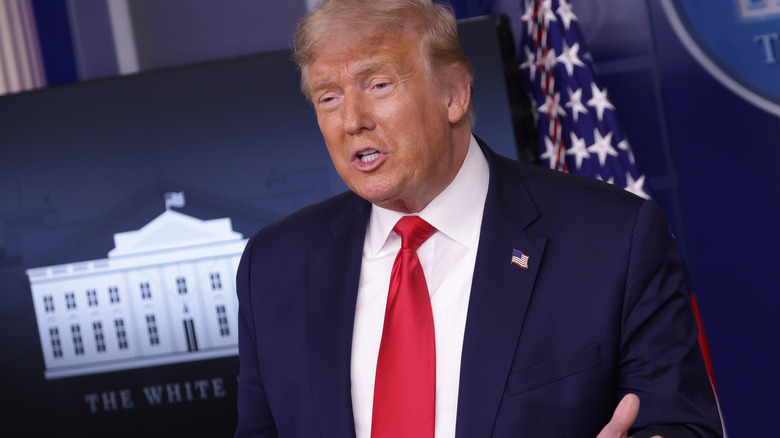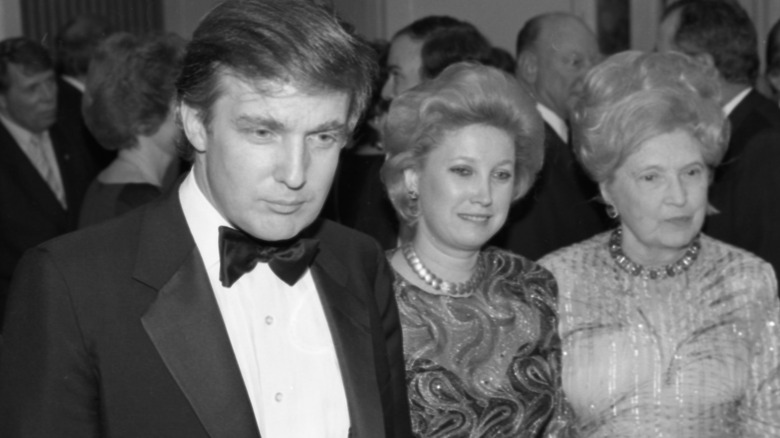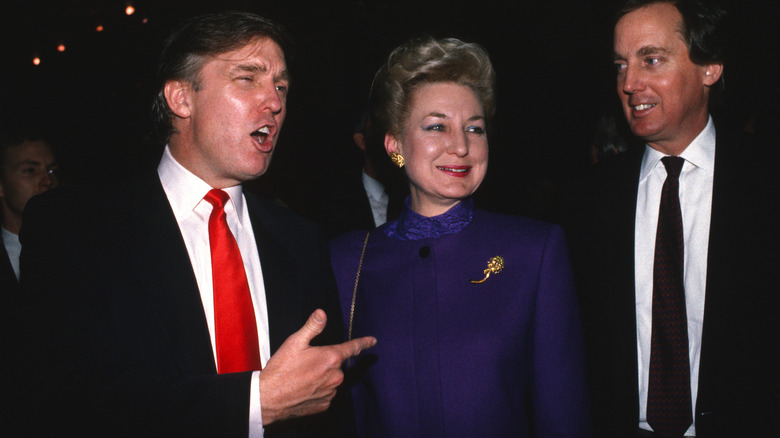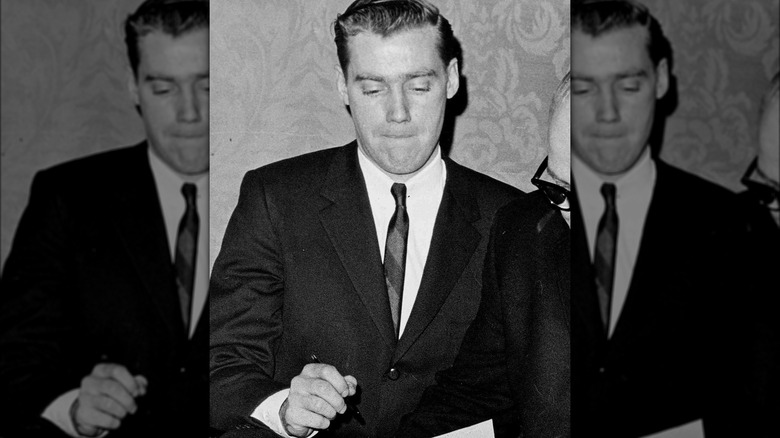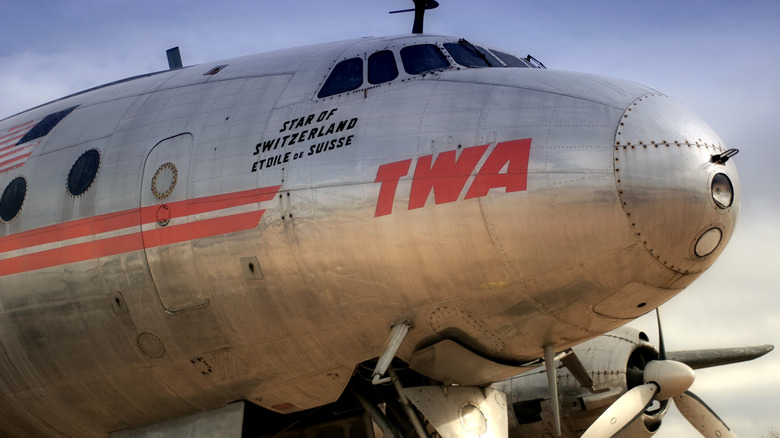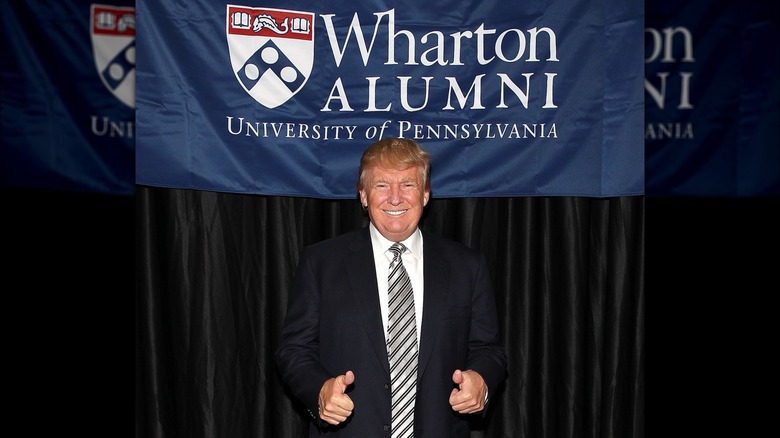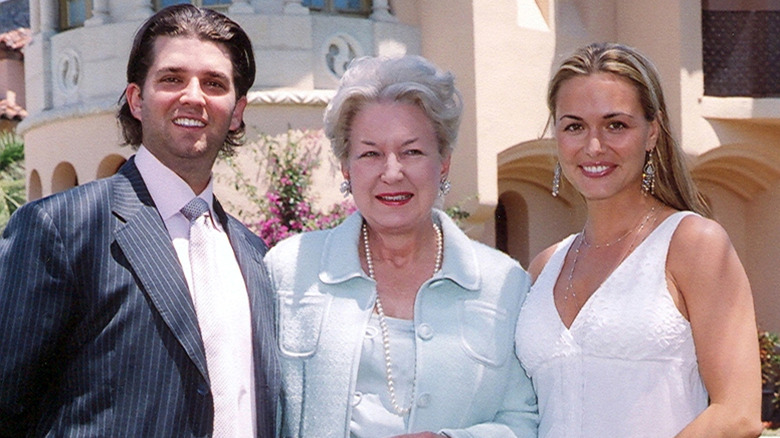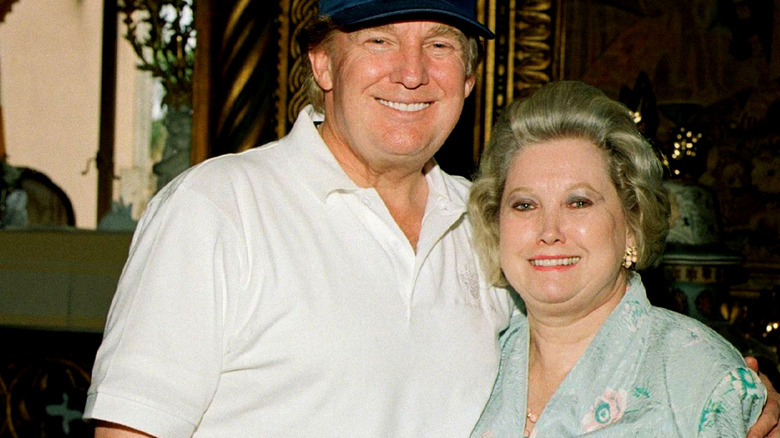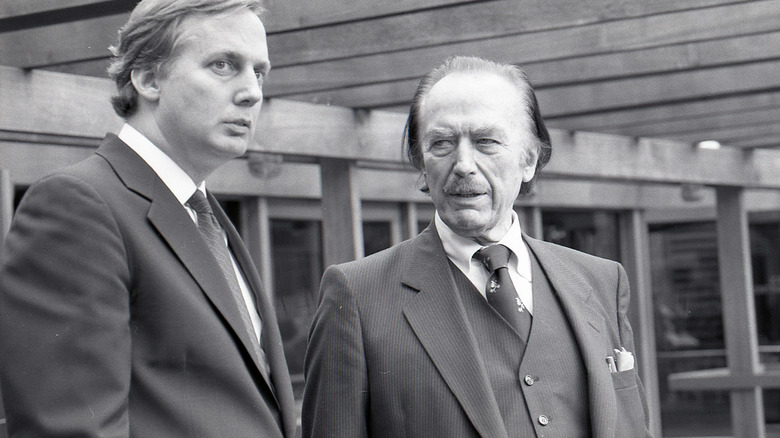8 Things Most People Don't Know About Donald Trump's Siblings
Donald Trump has never been one to keep his family out of the spotlight, and anyone who has so much as glanced at a headline in recent years knows that his children are in them as much as he is. But what about his siblings? They've had their share of the spotlight, too, and family history took center stage in 2020 with the absolutely wild release of Mary Trump's tell-all book, "Too Much and Never Enough."
Mary is the daughter of Donald's brother, Fred Jr. Unsurprisingly, he was a central feature of the book — and it provided an unprecedented look not only at her immediate family but the entire family dynamic. She told NPR, "The tale they spun [was] that he was just this failed guy who just couldn't accomplish anything. When my family did talk about my father, it was to say that, essentially he was handsome and kind — and 'kind' was always said as if it were not really a compliment."
Headlines were filled with revelations deemed the most shocking, including the fact that one of Mary's most vocal sources was reportedly Donald's sister, Maryanne. When she passed away in 2023, she left behind an apparently complicated legacy. Her private condemnation of her brother was noted in reports of her death, and it brought up a fascinating question: What actually went on behind the scenes, and were there other, less widely-reported tidbits out there about the Trump siblings?
Maryanne Trump Barry had apparently doubled-down on her thoughts about her brother
In 2020, The Washington Post published excerpts of a recorded conversation between Maryanne Trump Barry and her niece, Mary Trump. The conversations were widely publicized as proof of some of the claims made in Mary's book, and it was scathing stuff that included comments that ranged from confessing to doing his homework for him as a child, to stating: "It's the phoniness of it all. It's the phoniness and this cruelty. Donald is cruel."
After her passing, Donald took to Truth Social to pay tribute to her. He lauded her as being "A truly beautiful woman, tall and elegant, with a presence like no other, she was also a tremendous student, intellect, and Judge... She was a great Judge, and a great sister." That made it sound like they had mended fences, but according to what inside sources reported to People, that absolutely wasn't the case.
The anonymous source said that although they had been close, the bombshell release of the audio had driven a bit of a wedge between them. "The Trumps have always been a close family and a lot of this was kept quiet and not discussed publicly," the source was quoted as saying. "They didn't hate each other, so it was sad." They went on to say that "Maryanne loved her brother, but basically gave up on him. ... She didn't talk trash about him in public, but she'd had enough of his lies and fabulism..."
Maryanne Trump Barry on why she didn't join the family business
One of the bombshells dropped in the 2020 release of conversations between Maryanne Trump Barry and her niece was the confession that she had asked her brother for help in securing an appointment as a federal judge. That came via a recommendation to Ronald Reagan from Trump's attorney Roy Cohn. Barry said that although it was the only time she asked him for anything, she wasn't thrilled by the fact that he had apparently never let her forget it. But why didn't she go into the family business, instead?
Back in 2002, New York Magazine did a series on famous siblings. Buried fairly deep in the article is a short conversation between Donald and Maryanne Trump. She says that she didn't join the family real estate business because "I knew better even as a child than to even attempt to compete with Donald. I wouldn't have been able to win."
She also added that yes, she did work for the family business, but that her skills weren't used in the same way that her brothers were put to work. "I worked for my father for a number of summers," she said, "but I was doing woman's work, decorating lobbies."
Fred Trump Jr. rebelled by joining a Jewish fraternity
Even though Maryanne Trump Barry was the oldest child in the family, it seems as though Fred Trump Sr. never intended for her to take over the family business — as her comments about being assigned "woman's work" to New York Magazine would suggest. Her arrival was followed by Fred Trump Jr., and it was always seen as a given that he was the one who would take over the family business. He, however, had no interest in it, and instead had goals of becoming a pilot.
In a rare expression of regret, Donald Trump spoke to The Washington Post in 2019 about the pressure that he and his father put on his brother. Fred Jr.'s struggles with addiction were co-opted by Donald to illustrate his fight against the opioid crisis, but it was a tidbit reported by The New York Times that gave some fascinating insight into just how much Fred Jr. had wanted to separate himself from the family. Even as the Trump family worried when an Italian family moved into their neighborhood, Fred Jr. made what was seen as a statement when he went to college: He joined a Jewish fraternity.
Initially claiming to have Jewish ancestry, Fred Jr. was reportedly a beloved part of the Lehigh University fraternity. Friend Bruce Turry recalled, "It may have been Freddy's first attempt to make his own statement to his father. Freddy was a classic illustration of someone who had a father complex."
[Featured image by Louis Liotta/New York Post Archive via Wikimedia Commons | Cropped and scaled | CC BY-SA 4.0]
Family stress, drinking, and the end of a dream for Fred Jr.
Family history suggests that Fred Trump Jr. found his calling — flying — while he was at Lehigh University. It was the sort of university that had an aviation club, and although his family pressured him to lean toward real estate, it didn't work. Constantly going head-to-head with his father pushed him farther away, and although he secured a job with TWA as a pilot, his struggles with alcohol had thoroughly gripped him within a matter of years.
Most histories — including ones published in The New York Times — say that Fred Jr. set aside his flying career voluntarily. After getting married in 1962, flying for a bit, and then stepping down from that, he was back working maintenance on Trump crews by the time the 1970s were rolling down.
But when The Washington Post talked to Bob Kavula, the vice president of the TWA Retired Pilots Association, they heard a different story. Kavula said that Fred Jr. didn't make it past his year-long probation and that the probation ended with him "terminated because he had a drinking problem." One of his longtime friends, Annamaria Forcier, suggested there was something else at work, too: "My impression of it was that he was basically forced to go work for the family firm." Donald Trump, meanwhile, has admitted that's not what he wanted: "What he loved doing was flying planes."
If you or anyone you know needs help with addiction issues, help is available. Visit the Substance Abuse and Mental Health Services Administration website or contact SAMHSA's National Helpline at 1-800-662-HELP (4357).
Fred Jr. pulled strings to get Donald into college
Donald Trump is, it's safe to say, really proud of having gone to Wharton. He's famously called it "super genius stuff" and claimed, "I was a great student," in spite of the fact that one of his classmates, Lou Calomaris, told the Associated Press that "He was never going to have to study a lot. He was going to get a gentleman's degree." Information on his time there is hotly debated. Here's a story that may have slipped through the cracks: His brother, Fred Jr., reportedly pulled some strings to get him accepted in the first place.
Fred Jr. was, by most accounts, an incredibly likable sort of guy — and he just happened to be friends with someone who was working in the admissions office of the University of Pennsylvania back in 1966. That was James Nolan, who told The Washington Post that Fred Jr. had gotten in touch with him to ask if he'd interview his brother for his attempt at getting into the Wharton School of Finance.
Nolan ended up being the only one who interviewed Donald, and said his recommendation "must have been decent enough to support his candidacy." He added that getting into the school was, at the time, "not very difficult. I certainly was not struck by any sense that I'm sitting before a genius. Certainly not a super genius."
Maryanne Trump Barry's '90s-era comments about sexual harassment didn't hold up
When Maryanne Trump Barry died in 2023, her obituary in The New York Times touched on something less familiar than her legal troubles and relationship with her brother. Back in 1992, she went before the Interagency Committee on Women in Law Enforcement and said that while she was absolutely against sexual harassment in the workplace, she saw the policing of it as having gone too far. "What is happening is that every sexy joke of long ago, every flirtation, is being recalled by some women and revised and re-evaluated as sexual harassment. Many of these accusations are, in anybody's book, frivolous."
Do some more digging into the coverage her comments got at the time, and it's pretty shocking stuff — especially in a post-MeToo era world. Barry said that women were being irrationally confrontational and ruining the good times that could be had at work: "Where has the laughter gone?" she asked, suggesting that men were going to be afraid to be themselves and be uncomfortable at work, with so many women ready to make "frivolous accusations."
Surprising? Absolutely, and she actually went even farther (via The New York Times). She suggested that instead of complaining, women who felt they were being harassed in the workplace should "use humor and gentle sarcasm — the deft touch, the intelligent approach ... There is no more potent weapon in any profession than a woman with a feminine exterior and a will of steel, and I defy you to find one man who will disagree."
No one really knows anything about Elizabeth Trump Grau
For the sake of completeness, let's talk about Donald Trump's last surviving sibling, sister Elizabeth Trump Grau. It's weird, because when it comes to things that people don't know about her, that's pretty much everything.
In 2020, Donald tweeted a big thank-you for what he thought was his sister's public support, posted on a Twitter account called @thebettytrump. The problem? It wasn't her account at all. It was picked up on by some right-wing media outlets, who lauded her for stepping out of the shadows that she'd carefully kept around herself to back him, but ... she didn't, and when Vice reached out to her, what she told them was short, sweet, and to-the-point: "I'm trying to delete it. I don't even belong to Twitter. I have no statement. I'm just annoyed about this whole thing."
They also confirm that Elizabeth is such a private person that she wasn't mentioned much in Mary Trump's headline-making book. According to former Donald ally Michael Cohen, the brother and sister aren't particularly close. But here's an interesting little tidbit: When she married documentary producer James Grau in 1989, Donald was an usher at the wedding.
Robert Trump, video game mogul
Robert Trump died in 2020, and although the then-president Donald Trump issued a statement saying, "He was not just my brother, he was my best friend," Town & Country found that the youngest of the siblings had pretty much dropped out of the public eye, aside from an attempt to stop the publishing of his niece Mary's book. He spent most of his life as an executive in the family business, but he also held a pretty surprising position on the board of directors of one of the video game industry's top powerhouses ... albeit, quietly.
Robert was on the board of ZeniMax, which might not ring any bells. The games they oversee will, though: They're the parent company of Bethesda Game Studios, which is behind the "Elder Scrolls," "Fallout," and "DOOM" franchises. After his death, Bethesda released a statement saying that he'd been involved in the company since it began, adding (via GameRant) that "he was a constant source of guidance and counsel for the company for more than two decades."
Questions about Robert's influence on content and culture have popped up on the occasional message board forum, with players being surprised by the connection — particularly because of Donald's headline-making condemnation of violent video games. Just how much influence and input Robert has had over the franchises is unclear, but according to VentureBeat, he was one of a group of investors who contributed to giving ZeniMax $9.9 million in funding.
